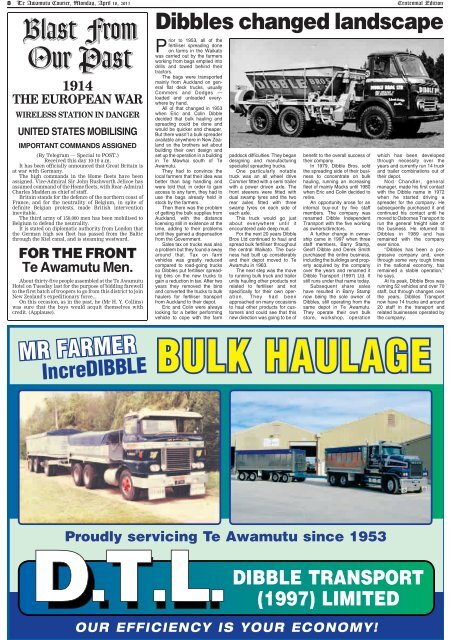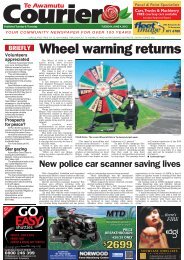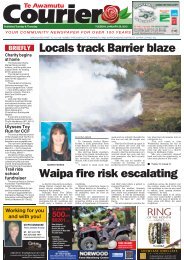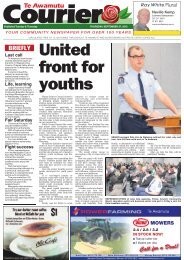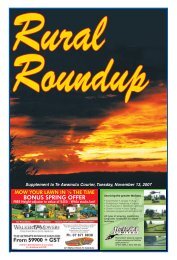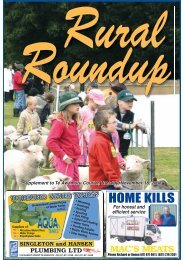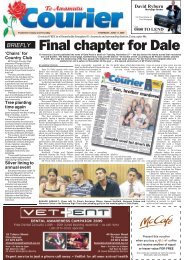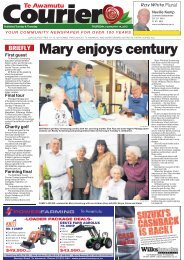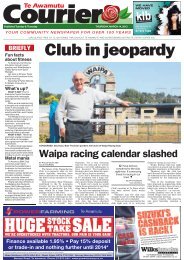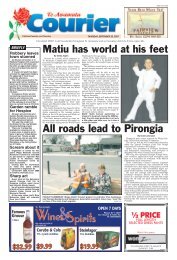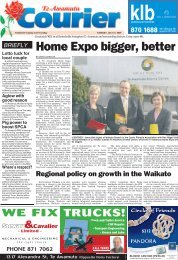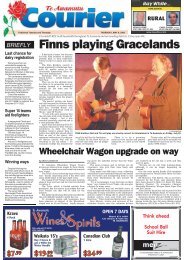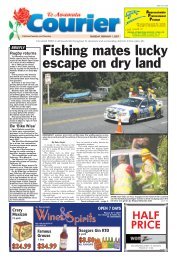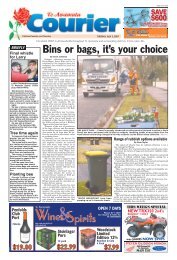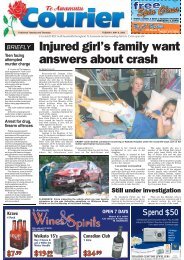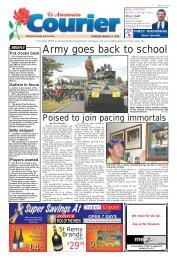Te Awamutu Courier - Centenary Edition - April 18th, 2011
Te Awamutu Courier - Centenary Edition - April 18th, 2011
Te Awamutu Courier - Centenary Edition - April 18th, 2011
Create successful ePaper yourself
Turn your PDF publications into a flip-book with our unique Google optimized e-Paper software.
8 <strong>Te</strong> <strong>Awamutu</strong> <strong>Courier</strong>, Monday, <strong>April</strong> 18, <strong>2011</strong> Centennial <strong>Edition</strong><br />
Blast From<br />
Our Past<br />
1914<br />
THE EUROPEAN WAR<br />
WIRELESS STATION IN DANGER<br />
UNITED STATES MOBILISING<br />
IMPORTANT COMMANDS ASSIGNED<br />
(By <strong>Te</strong>legram — Special to POST.)<br />
Received this day 10-10 a.m.<br />
It has been officially announced that Great Britain is<br />
at war with Germany.<br />
The high commands in the Home fleets have been<br />
assigned. Vice-Admiral Sir John Rushworth Jelicoe has<br />
assumed command of the Home fleets, with Rear-Admiral<br />
Charles Madden as chief of staff.<br />
Britain stands for the defence of the northern coast of<br />
France, and for the neutrality of Belgium, in spite of<br />
definite Belgian protests, made British intervention<br />
inevitable.<br />
The third army of 150,000 men has been mobilised to<br />
Belgium to defend the neutrality.<br />
It is stated on diplomatic authority from London that<br />
the German high sea fleet has passed from the Baltic<br />
through the Kiel canal, and is steaming westward.<br />
FOR THE FRONT<br />
<strong>Te</strong> <strong>Awamutu</strong> Men.<br />
About thirty-five people assembled at the <strong>Te</strong> <strong>Awamutu</strong><br />
Hotel on Tuesday last for the purpose of bidding farewell<br />
to the first batch of troopers to go from this district to join<br />
New Zealand’s expeditionary force...<br />
On this occasion, as in the past, he (Mr H. Y. Collins)<br />
was sure that the boys would acquit themselves with<br />
credit. (Applause).<br />
MR MR FARMER FARMER<br />
IncreDIBBLE<br />
Dibbles changed landscape<br />
Prior to 1953, all of the<br />
fertiliser spreading done<br />
on farms in the Waikato<br />
was carried out by the farmers<br />
working from bags emptied into<br />
drills and towed behind their<br />
tractors.<br />
The bags were transported<br />
mainly from Auckland on general<br />
flat deck trucks, usually<br />
Commers and Dodges —<br />
loaded and unloaded everywhere<br />
by hand.<br />
All of that changed in 1953<br />
when Eric and Colin Dibble<br />
decided that bulk hauling and<br />
spreading could be done and<br />
would be quicker and cheaper.<br />
But there wasn’t a bulk spreader<br />
available anywhere in New Zealand<br />
so the brothers set about<br />
building their own design and<br />
set up the operation in a building<br />
in <strong>Te</strong> Mawhai south of <strong>Te</strong><br />
<strong>Awamutu</strong>.<br />
They had to convince the<br />
local farmers that their idea was<br />
better than bag handling and<br />
were told that, in order to gain<br />
access to any farm, they had to<br />
use the bags already held in<br />
stock by the farmers.<br />
Then there was the problem<br />
of getting the bulk supplies from<br />
Auckland, with the distance<br />
licensing still in existence at the<br />
time, adding to their problems<br />
until they gained a dispensation<br />
from the Government.<br />
Sales tax on trucks was also<br />
a problem but they found a away<br />
around that. Tax on farm<br />
vehicles was greatly reduced<br />
compared to road-going trucks<br />
so Dibbles put fertiliser spreading<br />
bins on the new trucks to<br />
gain a reduction in tax. After two<br />
years they removed the bins<br />
and converted the trucks to bulk<br />
haulers for fertiliser transport<br />
from Auckland to their depot.<br />
Eric and Colin were always<br />
looking for a better performing<br />
vehicle to cope with the farm<br />
paddock difficulties. They began<br />
designing and manufacturing<br />
specialist spreading trucks.<br />
One particularly notable<br />
truck was an all wheel drive<br />
Commer fitted with a semi trailer<br />
with a power driven axle. The<br />
front steerers were fitted with<br />
dual swamp tyres and the two<br />
rear axles fitted with three<br />
swamp tyres on each side of<br />
each axle.<br />
This truck would go just<br />
about everywhere until it<br />
encountered axle deep mud.<br />
For the next 20 years Dibble<br />
Bros Ltd continued to haul and<br />
spread bulk fertiliser throughout<br />
the central Waikato. The business<br />
had built up considerably<br />
and their depot moved to <strong>Te</strong><br />
<strong>Awamutu</strong> in 1963.<br />
The next step was the move<br />
to running bulk truck and trailer<br />
units hauling other products not<br />
related to fertiliser and not<br />
specifically for their own operation.<br />
They had been<br />
approached on many occasions<br />
to haul other products for customers<br />
and could see that this<br />
new direction was going to be of<br />
benefit to the overall success of<br />
their company.<br />
In 1979, Dibble Bros. sold<br />
the spreading side of their business<br />
to concentrate on bulk<br />
hauling, running an increasing<br />
fleet of mainly Macks until 1980<br />
when Eric and Colin decided to<br />
retire.<br />
An opportunity arose for an<br />
internal buy-out by five staff<br />
members. The company was<br />
renamed Dibble Independent<br />
Transport with the five working<br />
as owners/directors.<br />
A further change in ownership<br />
came in 1997 when three<br />
staff members, Barry Stamp,<br />
Geoff Dibble and Derek Smith<br />
purchased the entire business,<br />
including the buildings and property<br />
acquired by the company<br />
over the years and renamed it<br />
Dibble Transport (1997) Ltd. It<br />
still runs under that name today.<br />
Subsequent share sales<br />
have resulted in Barry Stamp<br />
now being the sole owner of<br />
Dibbles, still operating from the<br />
same depot in <strong>Te</strong> <strong>Awamutu</strong>.<br />
They operate their own bulk<br />
store, workshop, operation<br />
BULK HAULAGE<br />
Proudly servicing <strong>Te</strong> <strong>Awamutu</strong> since 1953<br />
DIBBLE TRANSPORT<br />
(1997) LIMITED<br />
OUR EFFICIENCY IS YOUR ECONOMY!<br />
which has been developed<br />
through necessity over the<br />
years and currently run 14 truck<br />
and trailer combinations out of<br />
their depot.<br />
Nod Chandler, general<br />
manager, made his first contact<br />
with the Dibble name in 1972<br />
when he started driving a<br />
spreader for the company. He<br />
subsequently purchased it and<br />
continued his contact until he<br />
moved to Osbornes Transport to<br />
run the general freight side of<br />
the business. He returned to<br />
Dibbles in 1989 and has<br />
remained with the company<br />
ever since.<br />
‘‘Dibbles has been a progressive<br />
company and, even<br />
through some very tough times<br />
in the national economy, has<br />
remained a stable operation,’’<br />
he says.<br />
At its peak, Dibble Bros was<br />
running 52 vehicles and over 70<br />
staff, but through changes over<br />
the years, Dibbles Transport<br />
now have 14 trucks and around<br />
20 staff in the transport and<br />
related businesses operated by<br />
the company.


